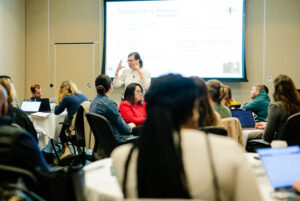News & Stories
Let her tell you a story

Heidi Schultz knows a good story when she hears it and a great story when she feels it.
In her storytelling classes at UNC Kenan-Flagler Business School, it’s the details that cut to the core — a distinctive crunch of a gravel road or the sound of crickets cutting the night, a hushed and frightened voice remembering a crime of the past.
In these stories, the tiniest moments of tension can be the most riveting. They are uplifting or sad or live somewhere in the emotional vastness in between.
Soon it will be her students’ turns to share.
In the first storytelling class Schultz ever taught for Carolina, a big box retail manager told a story about a family who begged him to open the store on Thanksgiving morning. Their stove was broken, and they needed a new one so their ill grandmother could cook what might be her last Thanksgiving dinner. The manager opened the store and helped the family pick out a stove. It turned out to be her final Thanksgiving.
“That manager has no idea that I still remember his story 12 years later,” says Schultz, a management and corporate communication professor. “On the surface, it’s a story about meeting customers where their needs are but there’s much more there. Storytelling humanizes us. And that’s what the best leaders are — people who we can relate to. That’s where the real power of business storytelling lies.”
All of her students have a compelling story somewhere within them. Schultz helps those stories rise to the surface.
A well-told story during an interview might lead to a job offer or promotion. A powerful story told just right could launch a brand — or an entire career. Good storytellers also tend to communicate effectively with colleagues and clients, even over email. Great storytellers are great motivators.

Schultz leads a class on storytelling within the Executive MBA Program.
A great story can say as much about the person giving the presentation as what they include in the presentation itself.
“It’s one rhetorical tool for a persuasive toolkit,” says Schultz. “Storytelling does not replace logic or data. It augments them. When you and I cross the threshold from home life to work life, we don’t leave behind what it means to be human. Our stories connect us to each other in those professional spaces as well.”
The next chapter
Now, Schultz is connecting with more business students than ever before. Chosen for the prestigious Fulbright Scholar Program, she took her Storytelling to Influence and Inspire class to Germany in April. Over three months, she is working with students at the Chemnitz University of Technology, better known for its nanotechnology research than its creative storytelling.
“I fundamentally believe – regardless of where we live in the world – that we’re much more alike than we are different just from my experience with teaching storytelling,” says Schultz. “There are themes that show our joys and our struggles and our fears and our accomplishments. It’s all of that.”
The Fulbright honor is the latest chapter in Schultz’s own remarkable story. For 26 years, she has been an innovative force at the Business School.
In 1997, Schultz launched the School’s business communication area along with the Business Communication Center, serving as its chair for 16 years. She has taught numerous oral and written business communication courses for the Undergraduate Business Program and MBA Programs. Her MBA business communication course was one of the first developed for MBA@UNC.
Schultz’s research focuses on the relationship between rhetorical patterns and quick writing and storytelling in corporate settings. Her forthcoming third book is an undergraduate business communication textbook co-authored by UNC Kenan-Flagler colleague Patricia Harms.
But fundamentally, Schultz is an enthusiastic storyteller and listener and loves talking about all the aspects that make a story great or not-so-great. By the final day of class, students tell a story within the context of a larger talk designed to persuade the intended audience. In essence, it can be about anything the students are passionate about. But it should closely follow the framework that makes a story not just great but also authentic.
“In a business context, we’re not telling stories the way they are usually told – to entertain. We’re telling stories to educate or influence or persuade,” says Schultz.
Schultz herself calls storytelling an unusual business school elective — her mom still doesn’t quite understand why her daughter, who holds a PhD in English, is teaching storytelling at a business school — but sees it as highly valuable.
She shares stories that sound like poetry, always evocative and sometimes provocative. She shares stories told badly, too, such as poorly produced video advertisements lacking in memorable imagery and relying heavily on cliché.
Whether it’s a William Shakespeare play, a Pixar movie or an old YouTube clip of Steve Jobs presenting a new Apple product, great storytelling shares a basic framework. There’s a protagonist with clear motivation and a challenging situation or disruption. This element is the “inciting event” that often rocks the status quo and drives the narrative. There’s tension and intentional pacing and carefully chosen words.

“Storytelling does not replace logic or data,” says Schultz. “It augments them.”
It’s the overarching purpose of the story that differentiates stories told in professional contexts. In business, the story of how one became a leader is likely about meeting and overcoming some sort of challenge in or out of the office. During a commencement speech in 2016, former Meta Platforms COO Sheryl Sandberg told a story about the loss of her husband to heart disease that was a stirring lesson about resilience and conveyed her strength as a leader at the same time.
“In storytelling in business, you’ve got to help your audience understand why it matters to them and what it is you want them to do as a result of hearing that story,” says Schultz. “Otherwise, we’ve just wasted everybody’s time.”
“It found me.”
The disruptive part of Schultz’s life story came early.
She was a music major in college but knew she didn’t want to perform music or teach it. Schultz had always loved writing, and even enjoyed the clacking sound her IBM Electric typewriter made during her short stint as a secretary.
After earning her bachelor’s degree from Lenoir-Rhyne College and a master’s in English from UNC Charlotte, she enrolled in UNC-Chapel Hill’s English PhD program. There she taught every kind of writing class she could, including technical and business writing and she served as director of the UNC Writing Center, offering students guidance on papers and essays as well as academic coaching.
Schultz was working at the Writing Center when Bob Adler, then a business law professor, and Jeff Cannon, then director of the Undergraduate Business Program, paid her a visit. They wanted her advice on how to revamp a business writing course, so she told them everything she could in a half-hour. Six months later, they returned.
“I thought to myself, I don’t know what else to say,” says Schultz. “And they said, ‘We don’t just want you to tell us how to teach business communication. We want you to come and teach it for us.’
“I wasn’t looking for a career in business communication and storytelling. It found me.”
In 2011, the UNC Executive Development team called Schultz to see if she would consider teaching a half-day storytelling course for retail executives. Soon, more organizations across industries, including the military, requested Schultz’s class and they still do. Her storytelling classes remain highly in demand among both undergraduate and master’s students.
“I think people are hungry for a space where they can unleash the stories they have within them,” says Schultz. “I always tell my students that they’re not going to be the same people at the end of the class as they were at the beginning. That’s because of how powerful their stories will be. And at the end of each class, I’m not the same either.”
In Germany, she’s eager to see the types of stories her new students will tell and whether they will be told in different ways than her Carolina students, but she’s fairly sure common themes will emerge. She plans to record a few of the stories to add to her “Stories from the Hill” podcast on Spotify, which features a collection of short stories told by Carolina students.
“The Fulbright is huge. It means so much to me,” says Schultz. “My goal is to capture more of these great stories and then ultimately go to different regions of the world and capture other stories. This is the first part of that journey. I’ll let you know how that goes.”
Whatever happens, it’ll be a great story.